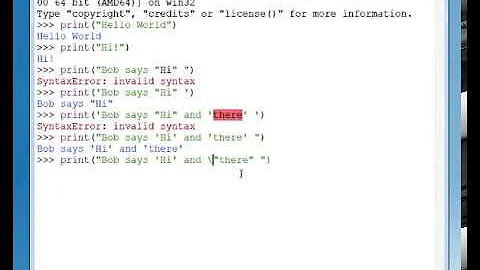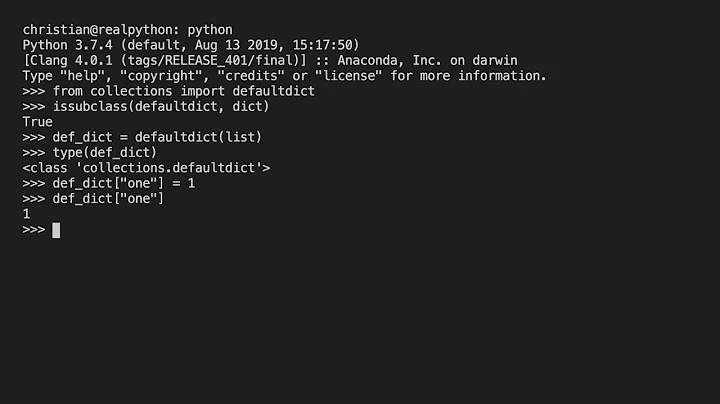How to create a Python dictionary with double quotes as default quote format?
Solution 1
You can construct your own version of a dict with special printing using json.dumps():
>>> import json
>>> class mydict(dict):
def __str__(self):
return json.dumps(self)
>>> couples = [['jack', 'ilena'],
['arun', 'maya'],
['hari', 'aradhana'],
['bill', 'samantha']]
>>> pairs = mydict(couples)
>>> print pairs
{"arun": "maya", "bill": "samantha", "jack": "ilena", "hari": "aradhana"}
You can also iterate:
>>> for el in pairs:
print el
arun
bill
jack
hari
Solution 2
json.dumps() is what you want here, if you use print json.dumps(pairs) you will get your expected output:
>>> pairs = {'arun': 'maya', 'bill': 'samantha', 'jack': 'ilena', 'hari': 'aradhana'}
>>> print pairs
{'arun': 'maya', 'bill': 'samantha', 'jack': 'ilena', 'hari': 'aradhana'}
>>> import json
>>> print json.dumps(pairs)
{"arun": "maya", "bill": "samantha", "jack": "ilena", "hari": "aradhana"}
Solution 3
# do not use this until you understand it
import json
class doubleQuoteDict(dict):
def __str__(self):
return json.dumps(self)
def __repr__(self):
return json.dumps(self)
couples = [
['jack', 'ilena'],
['arun', 'maya'],
['hari', 'aradhana'],
['bill', 'samantha']]
pairs = doubleQuoteDict(couples)
print pairs
Yields:
{"arun": "maya", "bill": "samantha", "jack": "ilena", "hari": "aradhana"}
Solution 4
Here's a basic print version:
>>> print '{%s}' % ', '.join(['"%s": "%s"' % (k, v) for k, v in pairs.items()])
{"arun": "maya", "bill": "samantha", "jack": "ilena", "hari": "aradhana"}
Solution 5
The premise of the question is wrong:
I know, json.dumps(pairs) does the job, but the dictionary
as a whole is converted into a string which isn't what I am expecting.
You should be expecting a conversion to a string. All "print" does is convert an object to a string and send it to standard output.
When Python sees:
print somedict
What it really does is:
sys.stdout.write(somedict.__str__())
sys.stdout.write('\n')
As you can see, the dict is always converted to a string (afterall a string is the only datatype you can send to a file such as stdout).
Controlling the conversion to a string can be done either by defining __str__ for an object (as the other respondents have done) or by calling a pretty printing function such as json.dumps(). Although both ways have the same effect of creating a string to be printed, the latter technique has many advantages (you don't have to create a new object, it recursively applies to nested data, it is standard, it is written in C for speed, and it is already well tested).
The postscript still misses the point:
P.S.: Is there an alternate way to do this with using json, since I am
dealing with nested dictionaries.
Why work so hard to avoid the json module? Pretty much any solution to the problem of printing nested dictionaries with double quotes will re-invent what json.dumps() already does.
Related videos on Youtube
Comments
-
Shankar over 3 years
I am trying to create a python dictionary which is to be used as a java script var inside a html file for visualization purposes. As a requisite, I am in need of creating the dictionary with all names inside double quotes instead of default single quotes which Python uses. Is there an easy and elegant way to achieve this.
couples = [ ['jack', 'ilena'], ['arun', 'maya'], ['hari', 'aradhana'], ['bill', 'samantha']] pairs = dict(couples) print pairsGenerated Output:
{'arun': 'maya', 'bill': 'samantha', 'jack': 'ilena', 'hari': 'aradhana'}Expected Output:
{"arun": "maya", "bill": "samantha", "jack": "ilena", "hari": "aradhana"}I know,
json.dumps(pairs)does the job, but the dictionary as a whole is converted into a string which isn't what I am expecting.P.S.: Is there an alternate way to do this with using json, since I am dealing with nested dictionaries.
-
qaphla almost 11 yearsNot that it solves your problem, but a better way to create pairs would be to replace your lines 2-4 with pairs = dict(couples).
-
Russell Borogove almost 11 yearsWhen you ask to print a dictionary, you're printing the conversion of the dictionary to a string anyway, so JSON is completely appropriate -- particularly if you're trying to interchange with Javascript.
-
Shankar almost 11 yearsI need an alternate method, since I am in need of updating and iterating through the dictionary after the double quote alteration. json.dumps converts the dict to string. Is there a way to make double quotes the default option.
-
Russell Borogove almost 11 yearsYou're not altering anything about the dictionary. You're creating a string representation of it. The dictionary doesn't contain single quotes. It contains strings. You are confused about what a dictionary is.
-
abarnert almost 11 years@RussellBorogove: Or, more fundamentally, confused about the difference between an actual string object and its representation.
-
Jon-Eric almost 11 years@ArunprasathShankar You need to explain why you think making double quotes the default is your only option. Converting to JSON doesn't preclude more updates. You can always convert to JSON again if there are more updates, right?
-
Lennart Regebro almost 11 yearsDictionaries do not have double quotes as default in Python, because strings doesn't have double quotes by default in Python. There is a reason for that, so what you are asking for doesn't really make sense. Please, therefore explain why you want this.
-
Raymond Hettinger about 9 yearsThe question seems fundamentally misguided. The "print" keyword calls __str__ on the dictionary and converts is to a string just like
json.dumps(pairs)does. The OP shows a basic misunderstanding he/she saids "but the dictionary as a whole is converted into a string which isn't what I am expecting." In fact, when you print an object, regardless of how you print it, the object is first converted to a string. -
Robino about 6 years@RaymondHettinger is right - the question is based on the assumption that there are single-quote strings and double-quote strings in python. What the OP really wants is to be able to have the string quoted using double quotes when it is printed out to build some javascript. For this the correct answer is simply
javascript_output += "my_js_var = " + json.dumps(my_python_dict)
-
-
Shankar almost 11 yearsSolution is fine for printing. What if I need to further update or iterate the dictionary after quote alteration?
-
Shankar almost 11 yearsI am looking for an alternate option where I can force the double quotes as the default option for Python dictionaries.
-
 Brent Washburne almost 11 yearsUpdate the
Brent Washburne almost 11 yearsUpdate thepairsand then execute this line again. -
 Pranjal Mittal over 10 years@FJ: In the second case json.dumps(pairs) is returning a string. What if I want a
Pranjal Mittal over 10 years@FJ: In the second case json.dumps(pairs) is returning a string. What if I want adicttype object output in which the string keys are in double quotes? -
 akhomenko over 7 yearsThis doesn't work if some of your dict values are bools and you plan to use the resulting string in some other context where it would be evaluated as Python code.
akhomenko over 7 yearsThis doesn't work if some of your dict values are bools and you plan to use the resulting string in some other context where it would be evaluated as Python code. -
penny chan over 6 years
json.dumpswill convert the dictionary to string, eventhough it looks good with double quotes,type(json.dumps(pairs))is string, I don't think this is what OP expect -
 Sidon almost 6 yearsThis is the answer that should be accepted as correct.
Sidon almost 6 yearsThis is the answer that should be accepted as correct. -
 Oldboy about 5 years@Sidon I second that.
Oldboy about 5 years@Sidon I second that. -
 David Beauchemin almost 3 yearsAnd if you use UTF-8 you need to
David Beauchemin almost 3 yearsAnd if you use UTF-8 you need toensure_ascii=False










